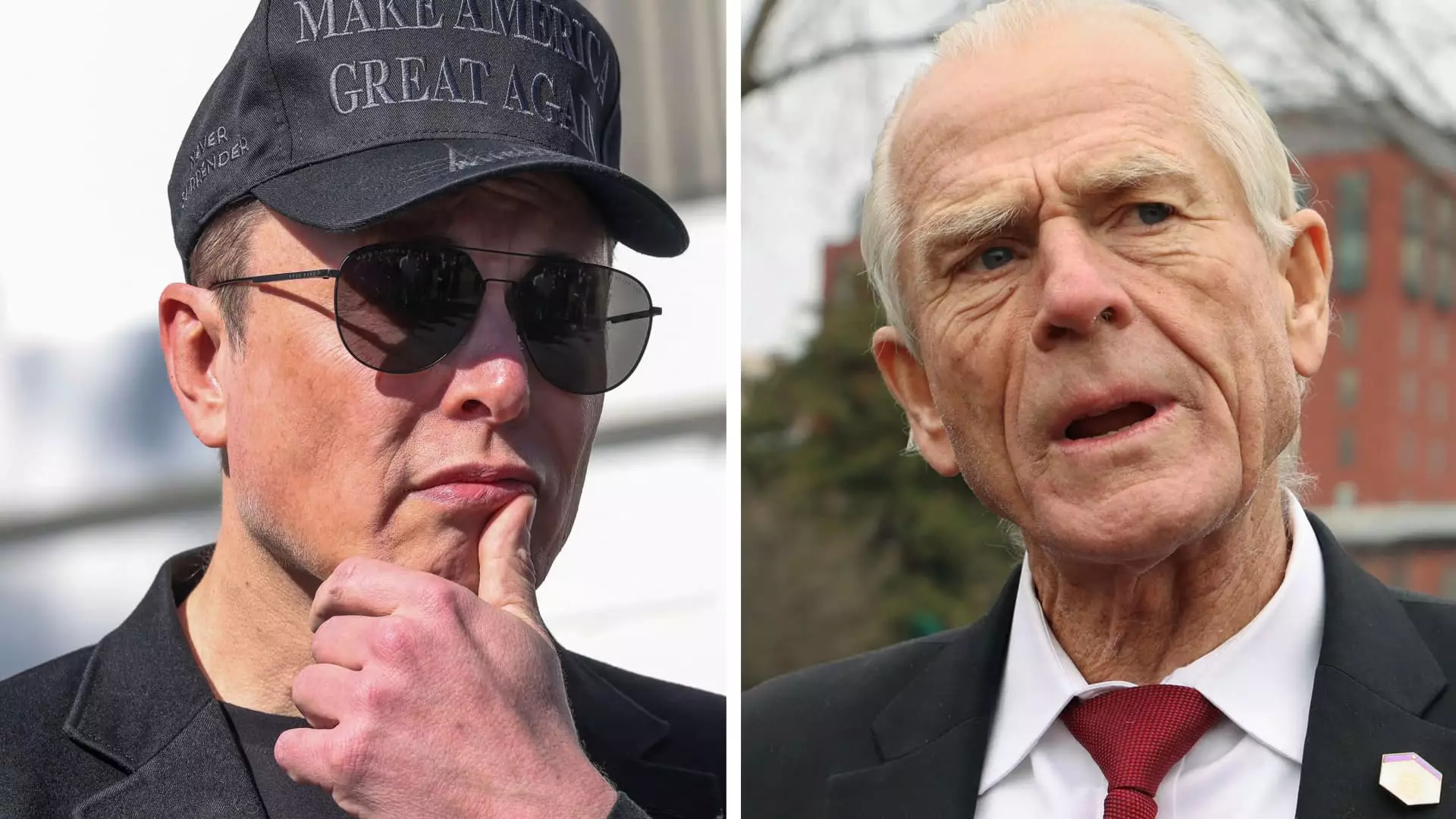In recent days, the tension between Elon Musk, CEO of Tesla, and Peter Navarro, President Trump’s advisor on trade, has reached fever pitch, shedding light on the turbulence within America’s economic policies. Musk’s acerbic social media remarks about Navarro reveal more than just personal animosity; they underscore a profound rift in the current administration’s trade strategy and highlight the implications of those strategies for American innovation. Musk’s pointed declarations, which have included phrases like “dumber than a sack of bricks,” reflect not only exasperation but also a growing concern for Tesla’s financial health amid shifting tariffs and trade regulations.
Musk’s critique of Navarro’s educational background as indicative of poor economic understanding is symptomatic of a larger conflict between two distinct philosophies regarding trade. While Musk advocates for minimal barriers to trade—a position he promotes through his ventures globally—Navarro’s rigid approach reflects the Trump administration’s move toward protectionism, prioritizing domestic production at the expense of global market interplay. This clash is emblematic of a broader debate in the United States regarding the balance between protecting American jobs and fostering global competitiveness.
Tesla’s Rocky Road Amid Trade Turbulence
As Tesla’s stock saw a sharp decline, dropping roughly 22% over the past week, Musk’s frustration with Navarro takes on added significance. The economic ramifications of tariffs are not abstract; they translate directly into economic performance and shareholder confidence. Tesla’s substantial losses—totaling over $585 billion since the beginning of the year—are a testimonially stark reminder of the very real financial stakes riding on trade relations. Investors, employees, and consumers alike are entwined in this saga, and Musk’s vocal criticism may be an attempt to galvanize public and political support against policies that threaten his company’s operational viability.
The imposition of tariffs on imported parts and materials adds another layer of complexity to Tesla’s production costs. Countries like Canada and Mexico serve as critical suppliers of steel and aluminum, which are essential for Tesla’s manufacturing framework. Paradoxically, while Musk’s manufacturing facilities in the U.S. might allow the company to sidestep some tariffs, the overall financial ecosystem he operates within is still adversely affected by these regulations. Analysts once believed that Tesla’s domestic assembly could provide a competitive cushion against tariffs, but the broader economic landscape presents a different picture laden with uncertainty.
The Irony of Musk’s Advocacy for Free Trade
Musk’s advocacy for a zero-tariff framework reflects a progressive mindset in an era where nationalism seems to be regaining traction. His assertion that both Europe and the U.S. should create a “free trade zone” is not only forward-thinking but stands in stark contrast to the more protectionist policies emerging from the current administration. Given that Tesla’s major European factory outside of Berlin and numerous supply chain connections tie the company closely to European economies, Musk’s views underline the self-interest driving his commentary on trade.
In times of heightened economic nationalism, Musk’s vision of open borders for trade and industry might appear naive. However, dismissing such perspectives can undermine the larger goal of fostering innovation and economic growth. The automotive industry, especially, thrives on the efficient exchange of goods, ideas, and talent across borders. The recent friction stemming from Navarro’s tariffs risks stymieing the very innovation that Musk’s enterprises seek to spearhead.
The Broader Implications of Musk’s Political Engagement
Musk’s place within the political landscape is complicated; as he engages with powerful figures both in and out of the administration, the implications for Tesla and its workers become more pronounced. His involvement in spreading a political message, while simultaneously attempting to distance Tesla from public disputes, speaks volumes about the complexity of navigating business in the current political climate. Tesla has faced protests and boycotts, further complicating its public image and drawing negative attention to its employees and stakeholders.
The recent spat between Elon Musk and Peter Navarro highlights not only the bi-polar nature of American trade policy but also the precariousness of innovation amidst such volatility. Innovation is built upon collaboration and openness, yet the current discourse surrounding tariffs poses a considerable risk to such values. The rifts within the administration only further complicate this landscape, as industry leaders like Musk seek pathways to prosperity against the backdrop of burgeoning economic nationalism.

